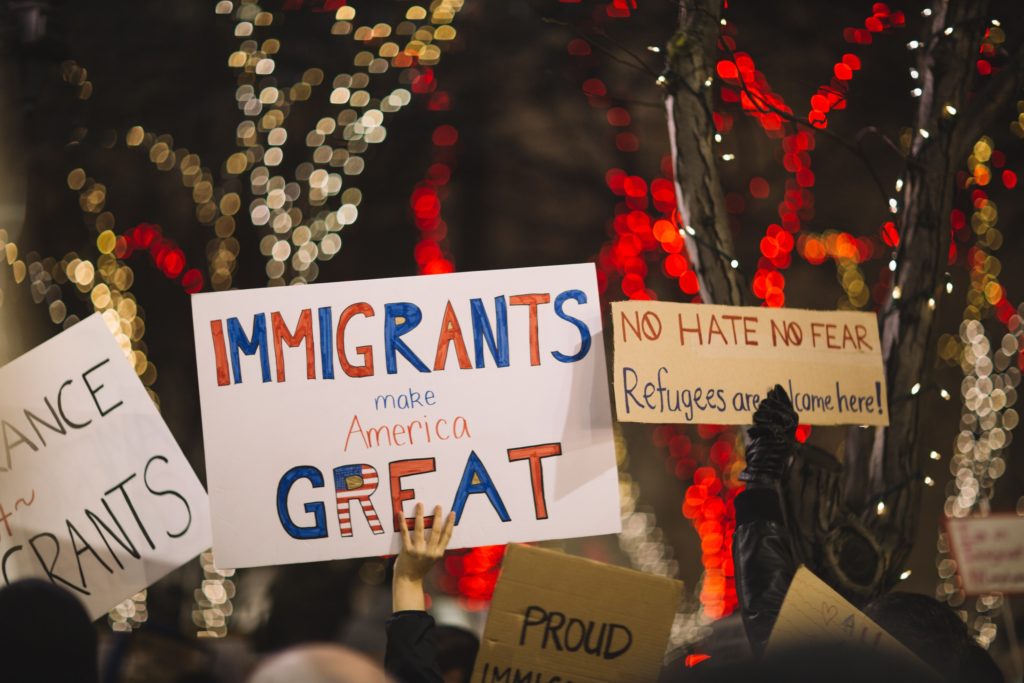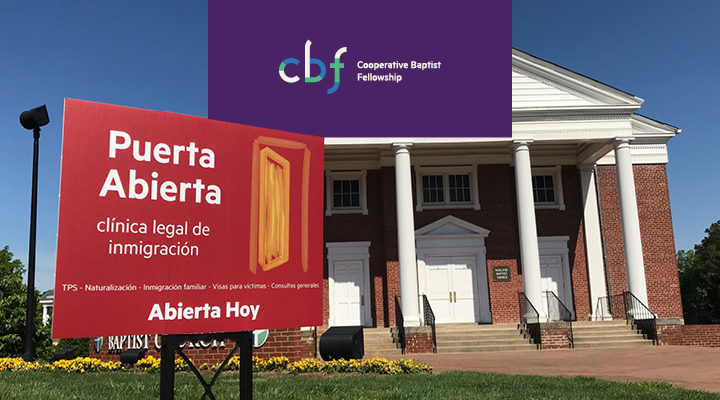It was a frigid, blustery evening in Rock Hill, South Carolina, when a cluster of 50 gathered in Fountain Park for a candlelight prayer vigil. But weather was no hindrance for Puerta Abierta, the immigrant legal aid ministry of Oakland Baptist Church sponsoring the vigil on behalf of young immigrants.
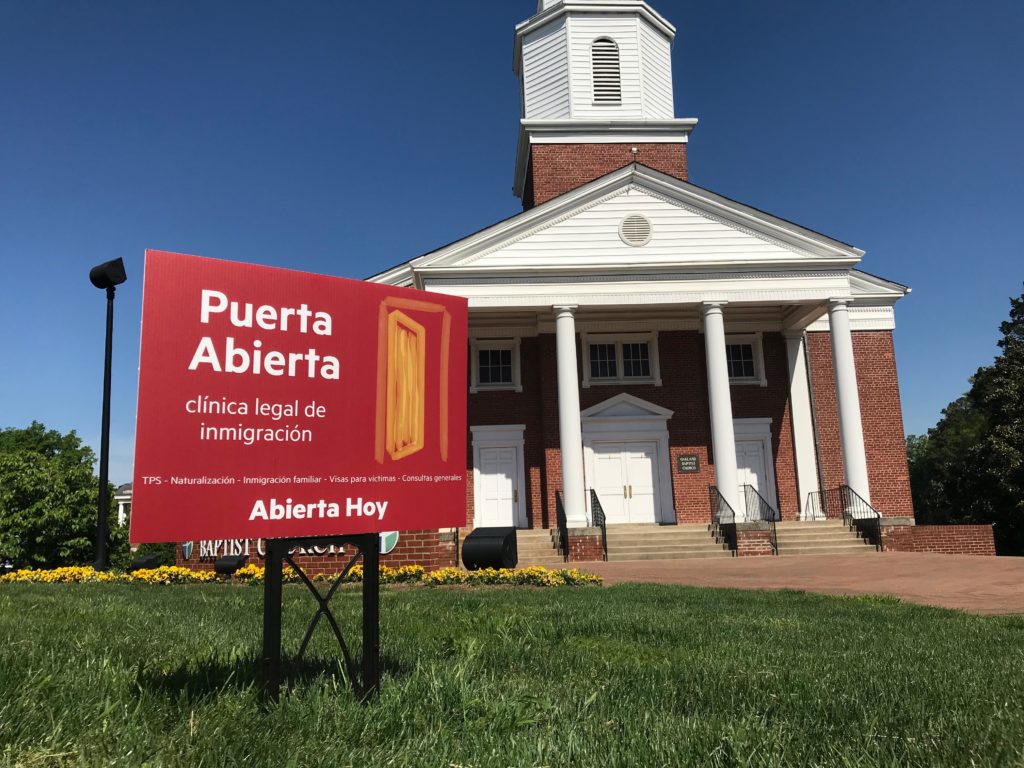
Oakland Baptist Church in Rock Hill, S.C., launched Puerta Abierta (“Open Door”) in 2017 to provide much-needed legal assistance to immigrants in York County, which boasts one of the fastest growing Hispanic populations in the country.
The day—December 7, 2017—marked the halfway point between President Trump’s rescinding of the Deferred Action for Childhood Arrivals (DACA) policy and the March 5 deadline for renewing the program. As their candles flickered in the cold wind, the small band read scripture and prayed for the young immigrants who feared losing their legal status and being deported from the only home they knew. In attendance was 22-year-old “DREAMer” Alma Govea who was brought to the United States illegally from Mexico when she was 4-years-old and who rallied for support of DACA alongside those gathered that evening.
Following the vigil, Blake Hart, director of Puerta Abierta and missions coordinator for Cooperative Baptist Fellowship of South Carolina, caught up with Govea to thank her and reflect on the vigil.
“I never knew there were so many people who cared about us,” Govea said to Hart, who leads Puerta Abierta’s legal aid program serving immigrants in Rock Hill and advocating on behalf of families like Govea’s.
“Can you imagine living in a place where you didn’t think there were even 50 people who cared about you?” Hart asked.
That’s why Hart and Oakland Baptist Church are partnering to renew God’s world through Puerta Abierta, a Department of Justice-accredited organization helping immigrants in Rock Hill access vital legal assistance for issues in the areas of naturalization, family-based immigration, temporary legal status, crimes of domestic violence and more. Meaning “open door,” Puerta Abierta has been forming together with the largely Spanish-speaking immigrant community in York County since 2017 and seeking trusted space with one of the most vulnerable populations in the United States.
“York County has one of the fastest growing Hispanic populations in the state, and South Carolina has one of the fastest growing in the country, and yet there are almost no immigration attorneys,” Hart said.
“Some people have come into the office in tears for fear of being deported, when actually they needed only a simple renewal of a document. Some are victims of domestic violence who are being threatened with deportation by the abusive spouse or partner. We can inform them that this individual cannot do that, thus helping get them out of the situation. Some are refugees we help in the continued process of getting green cards. Some just have tax or passport questions. There’s just so much fear—especially now—but we’re able to talk them through it and ultimately give people peace of mind.”
From a dedicated office at Oakland Baptist Church, Hart and a group of trained volunteers receive clients primarily by referral from partner organizations, including the International Center of York County and Safe Passage. Once the Puerta Abierta team has assessed an individual or family’s legal need, they leverage expertise among church members as well as using Hart’s own certified training to acquire visas, temporary legal status, naturalization and help with other legal maneuvering. In rare, regrettable cases of completely undocumented families, Hart said, Puerta Abierta must simply serve as a pastoral presence and assist in creating a plan for their assets and loved ones in the event of a deportation.
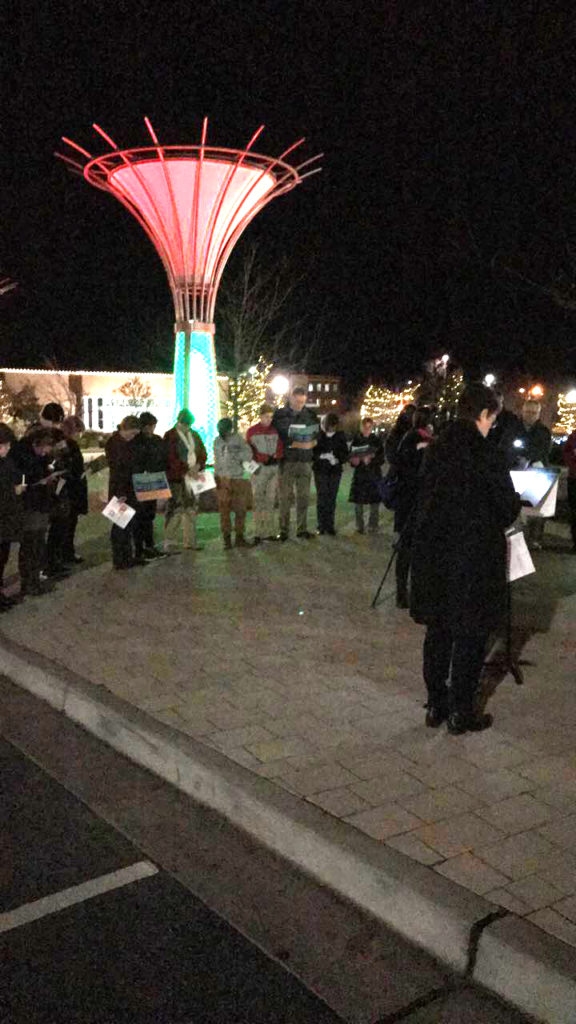
Oakland Baptist member Judy Mobley prays at a vigil for DREAMers on December 7, 2017, in Rock Hill, S.C.
Miguel Rullan, director of the International Center of York County, said he began partnering with Puerta Abierta after meeting Hart at a local public school’s Latino parent night. Since 2003, the center has offered ongoing resources to the immigrant population in Rock Hill, including interpretation, job connection, health care and abuse assistance. But they often encounter immigrants who require extensive legal aid. That’s where Puerta Abierta has become indispensable to the immigrant community and the three primary challenges they face, Rullan said.
First, Rullan explained, immigrants typically work two and three jobs just to make ends meet and can seldom afford the financial cost of an attorney or legal representative. Second, even if an individual or family can afford legal representation, language almost always poses a barrier for the primarily Spanish-speaking population seeking aid. Third and finally, immigrants routinely suffer from a simple lack of knowledge about the convoluted American legal system, especially the web of laws and procedures surrounding naturalization. With a low-cost, multilingual legal aid process, Puerta Abierta essentially affords immigrants the opportunity to live as independent, esteemed members of society, which is the ultimate goal, Rullan said.
“They’re no different than our families; they’re the same as the families we go home to every night,” Rullan said.
“They want all the same things that your family wants—to feel protected, to feel a part of the community, to feel loved. They want their children to succeed. They want opportunities. They might speak a different language or eat different types of food or listen to different kinds of music, but they’re just like us. They’re human beings who want to succeed in life.”
With a long history of engaging in refugee resettlement and English as a Second Language (ESL) training in Rock Hill, the Oakland congregation saw legal aid as a consistent next step, Hart said, following an assessment of the county’s needs and his own training in immigration advocacy. Judy Mobley, a retired educator and member of Oakland, volunteers with Hart two hours a week and noted the tangible work of Puerta Abierta intersected her journey with immigrants at a time when empathy alone had run its course.
“Through my career, I have seen immigrants in this area, documented or not, go through a lot of struggles and my heart said it was time to stop feeling sorry for them and do what I could to help them,” Mobley said.
Mobley and her husband began by accompanying a group of Oakland members to the U.S.-Mexico border wall for an educational trip led by Hart. In Laredo, Texas, as well as Nuevo Laredo, Mexico, the group not only learned about immigration law and border patrol, but witnessed firsthand the bewildering conditions that deportees and aspiring immigrants face.
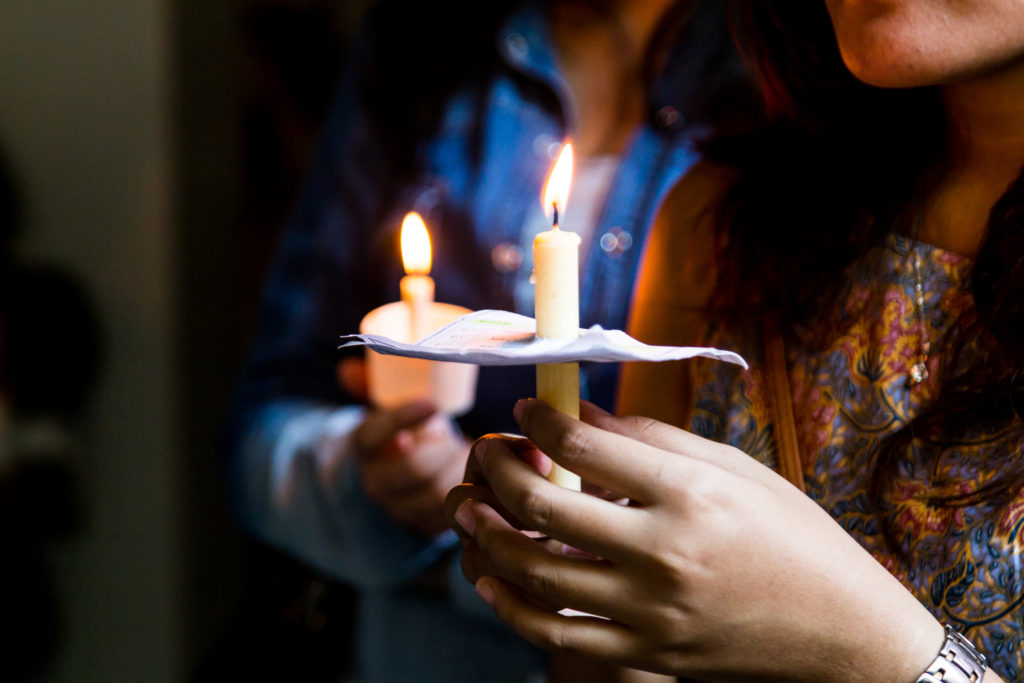
“Whether or not citizens understand how painful and difficult it is to live as an immigrant in the U.S., people of faith must continue to access and grow the church’s deep tradition of welcoming the immigrant,” said Blake Hart, director of Puerta Abierta and missions coordinator for Cooperative Baptist Fellowship of South Carolina.
Back in Rock Hill, Mobley began working alongside Hart and other volunteers at Puerta Abierta, entering case documentation and helping counsel new clients. Her greatest asset, however, has come through connecting Hart with counselors, ESL teachers and parents of Spanish-speaking students through her background in Rock Hill schools, which ultimately raises the profile of Puerta Abierta among immigrants in need of legal counsel, she says.
During office hours every Wednesday, Mobley says, she most frequently counsels women victims of domestic abuse, who, because of that abuse, are eligible for new visas, given their cooperation with law enforcement on their cases. In addition, Mobley regularly works with high school counselors to help immigrant students acquire the scholarships necessary to afford out-of-state college tuition. In the end, Mobley added, whether immigrants need help remaining in the U.S. or simply preparing tax returns, the church’s calling is to offer unconditional love and assistance, especially in a region of the country that tends to fear and belittle them.
“In my mind, whether they have come here legally or not, they are here now,” Mobley said.
“It is our duty as Christians to welcome them, to treat them as equals and to do what we can to help them. Immigrants, whether they came here with papers or not, deserve to be loved, and they deserve a quality of life. None of the immigrants I know are ‘milking the government’ or freeloading. They came here under terrible hardships. I saw that firsthand in Mexico and in the stories that I heard about the folks who were fleeing terrible places of poverty, gang violence, drugs or corruption.”
As Puerta Abierta continues to form together with Rock Hill’s immigrant community and partner groups, the organization will increasingly target big-picture advocacy and education in South Carolina. In fact, Hart said, December’s DACA prayer vigil was only the beginning of Oakland’s efforts to transform the way local government and citizens view the immigrant community and vice versa.
“Where we live, there is so much fear on both sides—immigrant and non-immigrant—and, in the long run, we hope to help each side see the humanity in the other,” Hart emphasized.
Ultimately, countering fear and opposition, even to Puerta Abierta’s ministry in Rock Hill, means countering the narrative that immigrants are criminal or violent with the narrative that they are good people who love and care for their children, Hart said. Eventually, he noted, whether or not citizens understand how painful and difficult it is to live as an immigrant in the U.S., people of faith must continue to access and grow the church’s deep tradition of welcoming the immigrant.
“In the Bible, there are some clear calls that I don’t think we give enough attention to today,” Hart said. “One is the Christian tradition of hospitality that I think we’ve lost. It’s not only a practice, but a spiritual practice, a way that we can connect to the divine by welcoming those who aren’t like us. But I think there’s a deeper call, and this is how Paul said it: ‘There is no Greek or Jew, no slave or free, no male or female.’ Those divisions are no more. And I think there’s a deep tradition in the Bible of calling us to a unity in diversity that we must reclaim.”
This article was first published in the Summer 2018 issue of fellowship! magazine, the quarterly publication of the Cooperative Baptist Fellowship. Subscribe to fellowship! magazine and CBF’s weekly e-newsletter fellowship! weekly at www.cbf.net/subscribe.
The Cooperative Baptist Fellowship is a Christian network that helps people put their faith to practice through ministry efforts, global missions and a broad community of support. The Fellowship’s mission is to serve Christians and churches as they discover and fulfill their God-given mission. Learn more about CBF at www.cbf.net.
